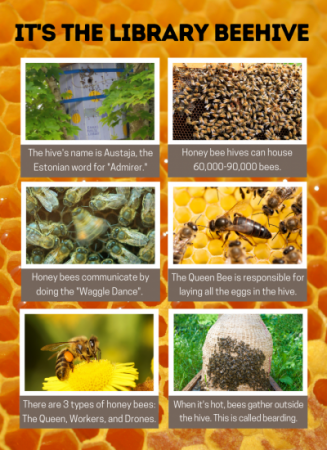Library Bees!
Did you know that the Camas Library has its own beehive? The hive is located in a tree on the Southeast corner of our block. If you look up, you should see a painted purple box where the bees live. We love our bees and have adopted the bee as our mascot. Here are some facts about bees as well as some additional resources where you can learn more about bees and beekeeping
Additional Resources on Bees
Bee Information for Kids
Pestworld For Kids: Bees
Great introduction to bees for kids, including different types of bees. Lots of fun facts!
Kids and Bees
Kids and Bees has lots of great information for kids, including a fun activities page, blog, and even a Minecraft project!
Dialogue 4 Kids: Bees (PBS)
In this episode of D4K, Host Joan Cartan-Hansen and her guest scientists, Kirk Tubbs and Ron Bitner, answer students’ questions about bees. They also look inside a hive with bee keeper Heidi Tubbs of Tubbs’ Berry Farm.
Learn More about Bees and Beekeeping
American Beekeeping Federation
For more than 75 years, the American Beekeeping Federation (ABF) has been working in the interest of all beekeepers, large and small, and those associated with the beekeeping industry to ensure the future of the honey bee. Check out their resources page to find lots of helpful information on bees.
University of Georgia’s Honey Bee Program
University of Georgia’s Honey Bee Program has a wealth of articles and information on bees.
The American Bee Journal
The Journal on all things bees that has been in publication since 1861.
Get Active
Washington State Beekeepers Association
An active community of beekeepers here in Washington who are involved in a wide variety of educational and advocacy work.
Clark County Beekeepers Association
Clark County Beekeepers Association is dedicated to the preservation and propagation of apiculture. CCBA meets to promote information and education primarily to hobby beekeepers and to the general public.
The Bee Conservancy
Our bees are in danger! You can help and learn about the problem at The Bee Conservancy’s website.


